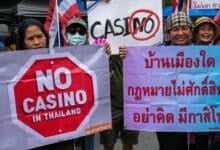High stakes in Thailand: Rolling the dice on casino legalisation

Thailand is moving forward with plans to legalise casinos within entertainment complexes.
The Finance Ministry has completed a draft of the Entertainment Complex Act, which will soon be subjected to a public hearing in accordance with Section 77 of the constitution. This hearing aims to incorporate public feedback before the bill is presented to the Cabinet for further consideration.
Deputy Prime Minister and Commerce Minister Phumtham Wechayachai confirmed that coalition party leaders and representatives will meet at Government House today to discuss various topics, including the entertainment complex bill. This proposed legislation seeks to legalise casinos and set regulations for the gambling industry.
The bill highlights the potential benefits of establishing entertainment complexes, citing the tourism industry’s significant contributions to the national economy. The document argues that the entertainment industry could further boost tourist spending.
“Promoting and regulating integrated entertainment complexes that meet standard requirements is an important measure to encourage domestic investment, which in turn will benefit the country and help support sustainable tourism,” reads an excerpt from the bill.
According to the bill’s 65 sections, an entertainment complex must secure a licence to operate, valid for up to 30 years. The operator is required to pay a registration fee of 5 billion baht and an annual fee of 1 billion baht.
Entrance fee
The complex will undergo an assessment every five years. After the initial 30-year period, the licence can be renewed for another 10 years.
The legislation also stipulates that individuals under the age of 20 are prohibited from entering these venues. While the complexes are open to all foreigners, Thai citizens must pay an entrance fee of 5,000 baht.
A policy board chaired by the prime minister will be established to set the rules and regulations governing these gaming complexes.
Chai noted that the project could significantly impact the economy. In 2022, the global business value of casino-based entertainment complexes reached US$1.5 trillion (53 trillion baht), with projections estimating an increase to US$2.2 trillion by 2028.
“Entertainment complexes generate huge income for many countries each year.”
Chai added that Macau, with a population of just 690,000, earns up to US$32 billion from its casino-based entertainment complex business. Las Vegas follows with US$30 billion, and Singapore with US$12 billion.
Global revenue
With Japan planning three similar projects, Thailand needs to accelerate its efforts to capture a share of the global revenue, he added.
Chai also cited a House committee report on the entertainment complex scheme, which estimated that the project could generate at least 12 billion baht in taxes for Thailand in its first year.
The House committee’s study focused on three aspects: the economic, social, educational, and cultural implications of having such a venue in Thailand; the business structure and revenue collection; and the legality and criteria for laws regarding entertainment and gambling regulations.
Five locations are being considered as potential hosts for this project: two in Bangkok and one each in the Eastern Economic Corridor, Chiang Mai, and Phuket, reported Bangkok Post.
However, Pariyes Angkurakitti, a spokesperson for the opposition Thai Sang Thai Party, criticised the project. He expressed concerns that lax law enforcement could impede efforts to regulate the casino industry effectively.
Latest Thailand News
Follow The Thaiger on Google News:


























